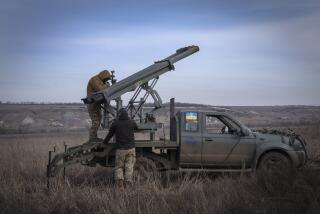Pentagon to launch cyberstrategy push in Silicon Valley
Defense Secretary Ashton Carter will unveil a new military cyberstrategy Thursday in the heart of Silicon Valley, reaching out to Facebook Inc. and other companies to help boost the nation’s digital defenses.
The two-day visit underscores a long-delayed shift in Pentagon priorities to recognizing cyberattacks on government agencies, major companies and crucial infrastructure as a major threat to U.S. national security.
Carter’s visit to Silicon Valley is the first by a Pentagon chief since the mid-1990s when the Internet was in its infancy, Wi-Fi and smartphones didn’t exist and America’s digital dominance was unquestioned.
In a speech at Stanford University, Carter will announce an effort to recruit computer engineers, programmers and others to help the Pentagon build “the force of the future.”
“Some of the reservists we will recruit to this unit have already funded and sold multiple companies,” said a senior defense official who briefed reporters but was not authorized to speak publicly.
Carter plans to visit Facebook’s sprawling campus in Menlo Park, Calif., to make his pitch. He also will meet with other tech industry leaders, engineers and venture capital groups that find and fund the valley’s start-ups.
A decade and a half after the CIA began backing private companies that develop surveillance systems, encryption tools and other spying technology, Carter will announce a similar effort to identify technologies with military applications.
The Pentagon will provide seed money to In-Q-Tel, a not-for-profit firm launched in 1999 to invest in high-tech companies for U.S. intelligence agencies. Pentagon officials said they have not yet determined how much to invest.
“Through this arrangement, we will make investments in early-stage technologies, such as nano-electrics, software and automation,” the official said.
Carter, a physicist and former visiting scholar at Stanford, warned of gaps in U.S. cyberdefenses long before he took over the Pentagon in February. He also repeatedly lambasted the Pentagon procurement system for taking too long to get useful technology to the military.
“He wants to think outside the Pentagon,” said another defense official, who also was not authorized to speak on the record. “So we’re not stuck inside this five-sided box.”
Carter has another equally challenging mission: He hopes to repair relations with Silicon Valley that fractured in the Edward Snowden scandal.
Snowden, a former National Security Agency contractor, leaked documents that showed the NSA — an intelligence agency that is part of the Pentagon — secretly tapped data feeds at Facebook, Google Inc., Yahoo Inc. and other companies.
The disclosures embarrassed the tech companies at home and abroad. Some have responded by deploying new encryption technology designed to tighten customers’ online security.
The Obama administration, meanwhile, has stepped up efforts to bring private industry and the government together to combat cyberattacks such as those that wreaked havoc at Sony Pictures, Bank of America Corp., Target Corp. and other U.S. companies.
The White House announced a fusion center to quickly share threat information, and the Department of Homeland Security announced plans this week to open a satellite office in Silicon Valley.
“The government’s attempt to bridge the gap between Silicon Valley and D.C. is huge,” said Peter W. Singer, a fellow at the nonprofit New America Foundation in Washington and co-author of “Cybersecurity and Cyberwar.” “But there are a lot of challenges. There is still a lot of anger there.”







